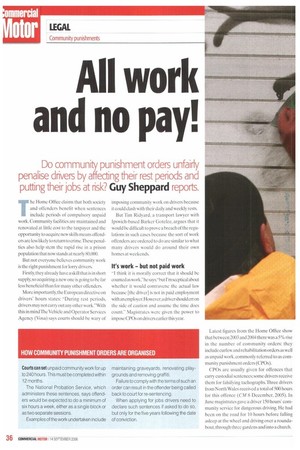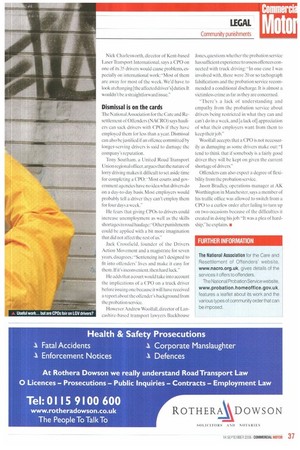All work and no pay!
Page 36

Page 37

If you've noticed an error in this article please click here to report it so we can fix it.
Do community punishment orders unfairly penalise drivers by affecting their rest periods and putting their jobs at risk? Guy Sheppard reports.
The Home Office claims that both society and offenders benefit when sentences include periods of compulsory unpaid work. Community facilities are maintained and renovated at little cost to the taxpayer and the opportunity to acquire new skills means offenders are less likely to return to crime.These penalties also help stem the rapid rise in a prison population that now stands at nearly 80.000.
But not everyone believes community work is the right punishment for lorry drivers.
Firstly, they already have a skill that is in short supply, so acquiring a new one is going Lobe far less beneficial than for many other offenders.
More importantly,the European directive on drivers' hours states: "During rest periods, drivers may not carry out any other work."With this in mind The Vehicle and Operator Services Agency (Vosa) says courts should be wary of imposing community work on drivers because it could clash with their daily and weekly rests.
But Tim Ridyard. a transport lawyer with Ipswich-based Barker Gotelee, argues that it would be difficult to prove a breach of the regulations in such cases because the sort of work offenders are ordered to do are similar to what many drivers would do around their own homes at weekends.
It's work but not paid work
think it is morally correct that it should be counted as work ," he says,"but I'm sceptical about whether it would contravene the actual law because 'the driver] is not in paid employment with an employer. However, a drivershould err on the side of caution and assume the time does count." Magistrates were given the power to impose CPOs on drivers earlier this year. Latest figures from the Home Office show that between 2003 and 2004 there was a 5% rise in the number of community orders; they include curfew and rehabilitation orders as well as unpaid work, commonly referred to as community punishment orders (CPOs).
CPOs are usually given for offences that carry custodial sentences; some drivers receive them for falsifying tachographs. Three drivers from North Wales received a total of 500 hours for this offence (CIVI 8 December, 2005). In June magistrates gave a driver 150 hours' community service for dangerous driving. He had been on the road for 10 hours before falling asleep at the wheel and driving over a roundabout, through three gardens and into a church. Nick Charlesworth, director of Kent-based Laser Transport International. says a CPO on one of its 35 drivers would cause problems, especially on international work: "Most of them are away for most of the week. We'd have to look at changing [the affected driver's] duties. It wouldn't be a straightforward issue."
Dismissal is on the cards
The National Association for the Care and Resettlement of Offenders (NACRO) says hauliers can sack drivers with CPOs if they have employed them for less than a year. Dismissal can also be justified if an offence committed by longer-serving drivers is said to damage the company's reputation.
Tony Sou thani, a United Road Transport Union regional officer, argues that the nature of lorry driving makes it difficult to set aside time for completing a CPO: Most courts and government agencies have no idea what drivers do on a day-to-day basis. Most employers would probably tell a driver they can't employ them for four days a week."
He fears that giving CPOs to drivers could increase unemployment as well as the skills shortages in road haulage:"Other punishments could be applied with a bit more imagination that did not affect the rest of us."
Jack Crossfield, founder of the Drivers Action Movement and a magistrate for seven years. disagrees.: "Sentencing isn't designed to fit into offenders' lives and make it easy for them. If it's inconvenient, then hard luck."
He adds that a court would take into account the implications of a CPO on a truck driver before issuing one because it will have received a report about the offender's background from the probation service.
However Andrew Woolfall, director of Lancashire-based transport lawyers Backhouse Jones, questions whether the probation service has sufficient experience to assess offences connected with truck driving: "In one case I was involved with, there were 20 or so tachograph falsifications and the probation service recommended a conditional discharge. it is almost a_ victimless crime as far as they are concerned.
"There's a lack of understanding and empathy from the probation service about drivers being restricted in what they can and can't do in a week, and [a lack of] appreciation of what their employers want from them to keep their job."
Woolfall accepts that a CPO is not necessarily as damaging as some drivers make out: "1 tend to think that if somebody is a fairly good driver they will be kept on given the current shortage of drivers."
Offenders can also expect a degree of flexibility from the probation service.
Jason Bradley, operations manager at AK Worthington in Manchester, says a member of his traffic office was allowed to switch from a CPO to a curfew order after failing to turn up on two occasions because of the difficulties it created in doing his job. "It was a plea of hardship." he explains. •
































































































































































































